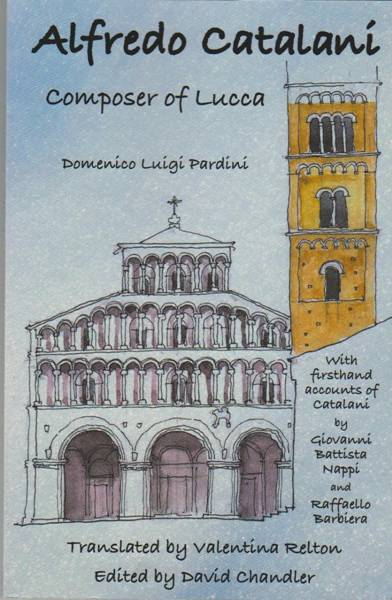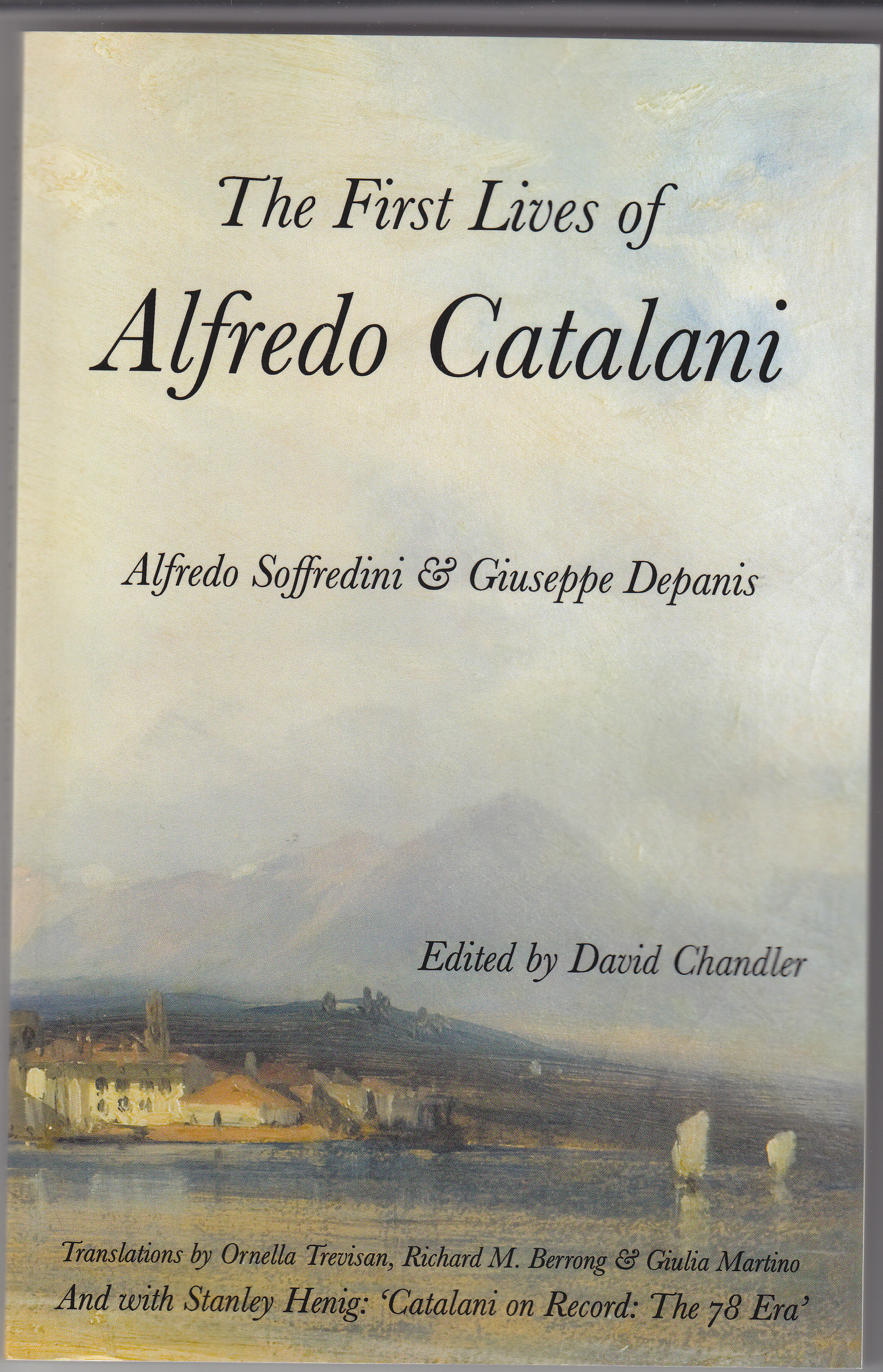Edited by David Chandler
142 pp, Durant Publishing, Norwich 2010-07-31


ALFREDO CATALANI, composer of Lucca
Edited by David Chandler
142 pp, Durant Publishing, Norwich 2010-07-31


Is there more to Alfredo Catalani than “Ebben ? Ne andro lontana “. There definitely is as everybody knows who has listened to complete recordings of La Wally and Loreley. This will normally wet one’s appetite for less illustrious works as La Falce, Edmea or Dejanice. Still a lot of opera lovers will know Catalani only as a co-citizen, a slightly older rival of Giacomo Puccini whom Catalani heartily despised. Several contemporary critics thought Catalani a finer composer. So did Toscanini who had his daughter and son christened with names (Wally and Walter) inspired by Catalani’s two best known operas. Up until now there was not an English language biography available. Enter David Chandler, an associate professor of Doshisha University in Kyoto; the old imperial capital of Japan. He deeply loves Catalani’s music and took care to edit and publish this 141 page biography. He is however not the main author of a rather hybrid book. The real story teller is Domenico Luigi Pardini, a local historian from Lucca who wrote a long 57 page article on the composer back in 1935. Pardini based his knowledge on his personal acquiescence with Catalani (the men corresponded) and on the correspondence of the composer with others. Most of these letters were in private hands and Chandler makes an appeal for more information on them as they seem to be lost and it is not sure they still exist. Not all people who inherited them will realize their worth and maybe a lot of them are gone forever. There is a second interesting article in the book. It is written by Giovanni Battista Nappi; a minor composer but an important critic in his time. He knew Catalani when the composer was only 21 and followed the career till the untimely and early death of the poor Lucchese at age 39. Nappi wrote this article to commemorate the almost forgotten composer in 1918; 25 years after his death. An then there are several annexes with stories on the composer’s family background, his teacher etc. The most interesting smaller articles are by Mr. Chandler himself. There is a small chapter on “Catalani and the Compact Disc” which will not enhance his popularity with serious musicologists as for these people the score, and only the score is the Holy Grail of music writing. But for most (if not 99%) of readers CD’s and DVD’s are the only means to get to know the more obscure works and a discussion of what is or has been available on record is a tremendous help to the interested collector. Mr. Chandler also adds an article on Catalani’s love life as Nappi and Padani were still rather discreet at the time of their writing as some ladies or their families would still have been alive. This is the part of the book where one sighs and clearly realizes there is another method to compile a biography than the one employed here. I would greatly have preferred Mr. Chandler to have put all the interesting information given by Nappi, Padani and tutti quanti into an uninterrupted flow of his own; even while consequently mentioning his sources. Now we get two biographies (and even a small third one) after another. So I think it a bit of a pity Mr. Chandler didn’t wield them into one piece. I don’t know why he didn’t do it. Is it academic rigour ? Honesty in giving Padani and Nappi their due ? Or maybe a lack of knowledge of Italian (the articles were translated by a professional translator) ? Or is it frustration that a lot of primary sources are lost or in private unknown hands plus the fact that Kyoto is not exactly in the neighbourhood of Italy ? A consequence of the method used is that none of the writers make it clear why in the end Ricordi was not interested any more in Catalani and preferred Puccini. As contemporaries they lacked our hindsight, remembered too well Puccini’s many failures from 1910 on. They couldn’t know at the time that due to the lack of new interesting scores all those failures would be rediscovered during the last fifty years of the 20th century so that Fanciulla, Turandot, Trittico and now even La Rondine have taken their rightful place in the theatres. They still thought that Catalani ‘s reputation suffered from some awful libretti but so did Puccini’s till La Bohème (is there another opera with a more ridiculous break between act 1 and act 2 than Manon Lescaut ?). In the end it was Puccini’s melodic gift that superseded Catalani and Giulio Ricordi was right to put his eggs in the basket of the younger composer. Le Villi hasn’t arias like “E lucevan” or “Ch’ella mi creda” but one still hums along with the whole opera after a few hearings while one needs a lot more time to adjust to the best of Catalani who on the same tune smith level cannot compete, even not in La Wally. But, apart from the reservations, Mr. Chandler has done us a great service.
The First Lives of Alfredo Catalani
David Chandler already edited some firsthand accounts on the life and the art of the composer: “Alfredo Catalani, composer of Lucca (Durrant Publishing 2010, 141 pages)”. He now continues the good works with “The First Lives of Alfredo Catalani (Durrant Publishing 2011, 163 pages)”. It is no use crying over spilt milk. Still I regret the fact that one so knowledgeable as Mr. Chandler didn’t write himself a biography of the composer. Instead once more he prefers (for reasons of musicological integrity ?) several interesting texts written by Catalani’s contemporaries. The articles by Alfredo Sofferini are interesting as they reveal the actual reception of Catalani’s operas during his lifetime; the first text written three years before the untimely death of the Lucchese composer at a time when Edmea was still more popular than Loreley. The second article is an obituary and once again one is stricken this time by the fact that La Wally, premiered two years before, is mentioned somewhat fleetingly. Soffredini gives us a full account of Catalani’s burial and contrary to later reports the whole younger generation of composers attended. Some judicious footnotes by Mr. Chandler give us some details on rather obscure though interesting figures like Antonio Cagnoni (I was very impressed by pirate recordings of his Don Bucefalo and Riccardo III).
Still more interesting and the heart of the book are the two articles by critic and personal friend Giuseppe Depanis, an ardent Wagnerite. The first article originally was a 43 page pamphlet written after Catalani’s death and it gives us useful and interesting details on the operas and the often wretched conditions in which they were first performed. The second article was written in 1915 and profits from better insight in Catalani’s works. By that time too the taboo on the composer’s deteriorating health and his slow death was less great and Depanis gives us a lot of painful details on Catalani’s changed physique. All in all Sofferini and Depanis offer us a rather rounded portrait of the composer and I found their articles to be even more interesting than those by Nappia and Pardini in the first book though that one gives us an interesting look on Catalani’s love life by David Chandler himself. The editor too publishes several letters from the composer himself to a friend. The biggest surprise will be Catalani’s derisory remarks on Verdi’s music. Catalani thinks that Verdi’s success “is not the merit of his music which is not that great”. He firmly believes politics is the reason behind the older composer’s triumph who at the outset of Catalani’s career was his greatest rival until the meteoric rise of Mascagni and finally Puccini. This interesting books ends with a discussion of recordings of Catalani on 78 tours by Stanley Henig (Chandler wrote an article on the CD recordings in the first volume). Mr. Henig seems a fair judge to me on all those interesting records which lucky for us are now most of the time available on labels like Preiser. I admit I am somewhat prejudiced as I myself (like Mr. Henig) thinks Hina Spani’s recording of the famous “Ebben” is unsurpassed. And I too admire Merli and Scacciati in Loreley. All in all David Chandler has done a nice job and we now have a far wider and correct perspective on Italian composers and the opera scene at the turning of the century thanks to the works of Dryden, Mallach and Chandler. So, who of these gentleman will take up the challenge and write (or edit) a good English biography of the missing links Giordano and Cilea ?
Jan Neckers